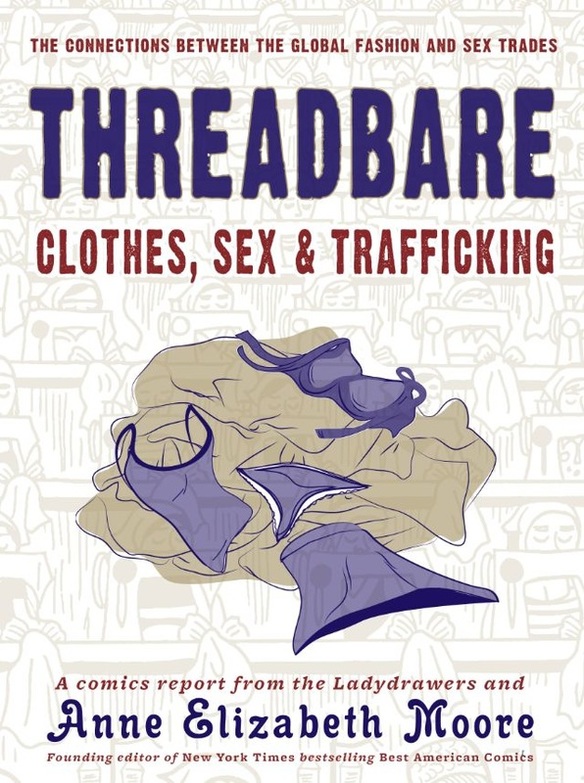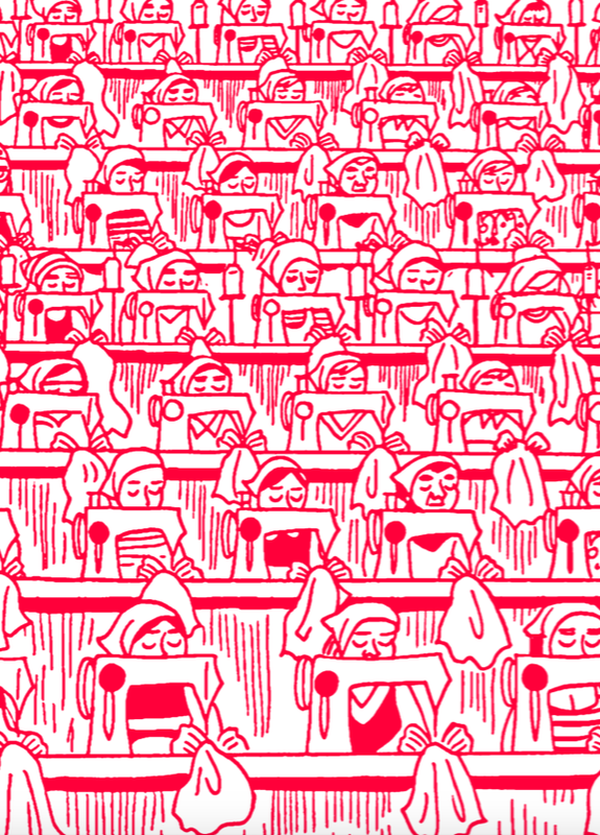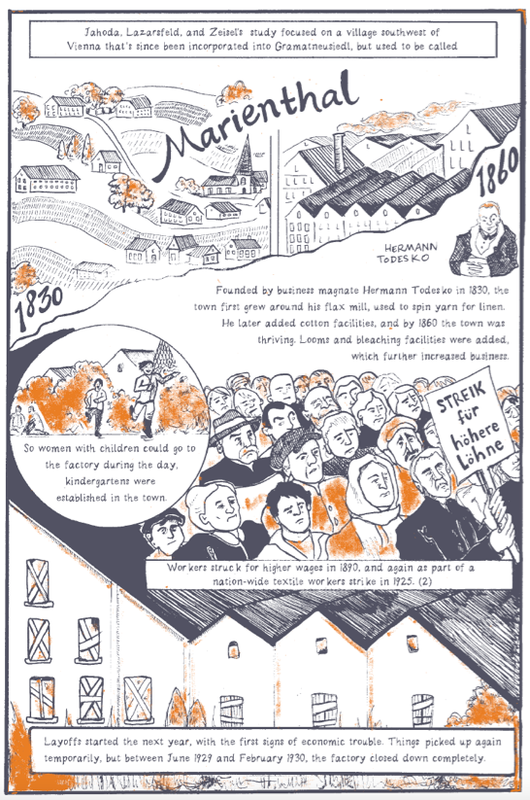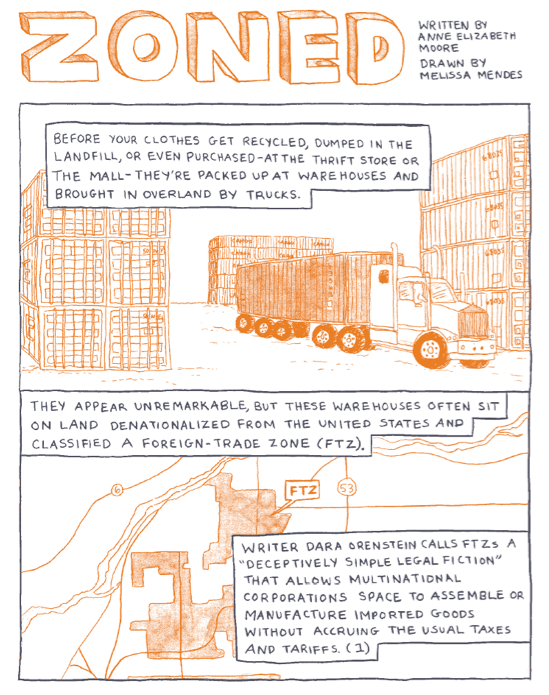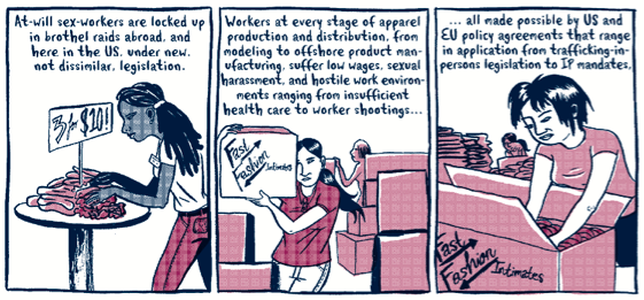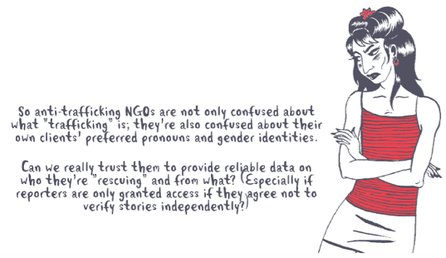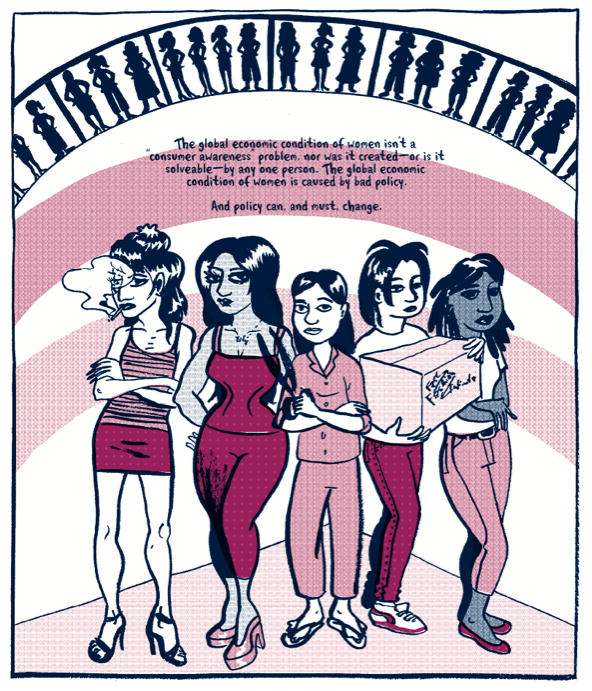REVIEW
Threadbare:
Clothes, Sex & Trafficking
♦
By IZZY STAR | 13 August 2016
Microcosm Publishing, 2016
There are a number of systems in this world that feel so widespread—so vast, complicated, and utterly obscured—that it is hard to know where and how to begin to learn about them. Where my clothes come from and how I fit into the global garment trade as a consumer has always been something I’ve known very little about beyond a vague sense of dread that something is deeply broken, and I'm always left wondering how one can begin to make sense of such a massive, dubiously cloaked system. Lucky for me (and many like me, I suspect), there are the Ladydrawers.
|
In their own words, the Ladydrawers are an “unofficially affiliated group that researches, performs, and publishes comics and texts about how economics, race, sexuality, and gender impact the comics industry, other media, and our culture at large.” The collective has been producing a variety of print and digital projects since 2010, and while their work extends beyond comics journalism, they have consistently made compelling, well-researched, extremely accessible journo-comics on a variety of topics. Threadbare: Clothes, Sex & Trafficking is no exception.
"Moore reveals a world in which trade policies set by men in western countries create substandard working conditions for women across the globe." |
Morgan, Sheika, Rae, and Delia of The Ladydrawers
|
Threadbare is a collection of investigative journo-comic stories about the international garment trade. The project began as a serialized monthly strip on the online nonprofit progressive news organization Truthout.org, but has since been expanded into this book, which includes content not previously published on the web. Each story was researched and written by journalist Anne Elizabeth Moore and illustrated by a handful of wonderful cartoonists and illustrators.
|
Anne Elizabeth Moore
|
With each story in Threadbare, Moore paints a picture of a world in which trade policies set predominantly by men in western countries create substandard working conditions for women across the globe. According to Moore, the garment industry provides work for between 1/6 and 1/7 of women worldwide. As a result, tapping into this immense system naturally touches on a number of other pervasive issues—namely poverty, women’s job opportunities, and the regulation of sex work.
"tapping into this immense system naturally touches on a number of other pervasive issues" |
|
Threadbare takes the reader on an informational jaunt around the globe, shedding light on several different stages of production and consumption. The scope of this subject is enormous as the garment industry involves a number of distinct but interconnected global systems and players, but the clarity with which Moore and the Ladydrawers break down parts of this immense system into smaller, digestible pieces brings an overarching framework into focus. Reading this book leaves you with the baseline knowledge to back up what you might have always suspected: that a whole lot of people are making a ton of money at the expense of the rights, conditions, and livelihoods of workers who are predominantly women.
"a lot of people are making money at the expense of the rights, conditions, and livelihoods of workers who are predominantly women." |
Illustration by Ellen Lindner
|
|
Excerpt from “Diearbeitslosen von Marienthal,” illustrated by Delia Jean
|
The book is divided into four geographical areas: the US, Austria, Cambodia and The World. Each section is grounded by an introductory note written by Moore and is explored further via a number of comic strips on interrelated topics. While I was initially perplexed that an entire section was dedicated to Austria, this chapter produced some of my favorite strips. The first strip in the section, “Diearbeitslosen von Marienthal,” tells the story of the town of Marienthal, which was built around a flax mill and several satellite industries that were grounded in producing yarn from the flax. This story discusses the effects of the massive unemployment that occurred in 1930 when the mill shut down for good. Delia Jean’s pastoral illustrations of Austria—at once playful and deeply sad—make the text feel like a melancholy fairytale. The rolling hills of Marienthal shift quickly into lines of picketing employees striking for higher wages. It feels like a strip torn from an old European tome.
"much of the book covers territory that I found disturbingly revelatory" |
|
The illustrators and cartoonists featured in this volume are excellent across the board and their interpretations of Moore’s text add remarkable depth. The strips “Zoned” and “Red Tape”—both illustrated by Melissa Mendes—are two of the most technical strips in the volume. “Zoned” discusses United States Foreign-Trade Zones, the mysterious places where goods are imported and assembled without accruing the usual taxes and tariffs, and “Red Tape” explores the international trade agreements that dictate how, where, and when goods can be sold, who can sell them, and to whom. Moore’s clear explanations on these complex subjects, paired with Mendes’ concise but nuanced illustrations, make these strips a thoroughly engaging read on an otherwise unapproachable subject. "thrift stores make immense profits by exploiting workers and volunteers" |
Excerpt from "Zoned," illustrated by Melissa Mendes
|
Though the issues Moore and the Ladydrawers unpack are often horrifying and jarring to read (particularly the abysmal working conditions laborers endure at all stages of production), sadly, some are not particularly surprising. However, much of the book covers territory that I found disturbingly revelatory. For example, the “Business of Thrift"—illustrated by Julia Gförer—discusses the way thrift stores make immense profits by exploiting workers and volunteers, selling garments back to developing countries, and often tossing a large percentage of garments straight into landfills. I was particularly shocked by the final chapter ("The World"), which examines, among other things, NGOs that place women back into the garment industry under the pretense of “liberating” them from what they call sex trafficking (but may in fact be at-will sex work), reintroducing women into unsafe working conditions with devastatingly low wages.
|
As a standalone work of journalism, Threadbare is excellent. The collection strikes a fair balance between chapters that explain complex legal frameworks and narratives and interviews that keep the collection deeply personal, emotionally engaging, and not overly technical. The use of comic strips to deliver this information is a huge part of what makes this book so accessible, and the medium acts as an immensely helpful organizational tool. Threadbare moves so quickly and covers such a wide range of topics that it’s easy to expect a sort of intellectual whiplash, but the comic strip format provides the perfect vehicle for shifting from one subject to the next, and the distinct style of each story keeps the text moving swiftly and methodically.
|
In the introduction, Moore states that she hopes to “draw a concise image of something we cannot see, articulate systems we cannot envision, and share information to which we often simply do not have access.” The Ladydrawers have done just that. Threadbare is the type of book I wish I had been forced to read in high school—the kind of counter-narrative education that cultivates more thoughtful and engaged citizens. If you have clothes on your back, whether they're from a retail store or a thrift shop, Threadbare should be required reading.
Excerpt from "The Connecting Threads," illustrated by Leela Corman
Microcosm is a small publishing house and distributor that empowers readers to make positive changes in their lives & in the world around them.
Visit their web site to purchase a copy of Threadbare: Clothes, Sex & Trafficking,
and subscribe for $10-$30 per month to receive all their new titles!
Visit their web site to purchase a copy of Threadbare: Clothes, Sex & Trafficking,
and subscribe for $10-$30 per month to receive all their new titles!
